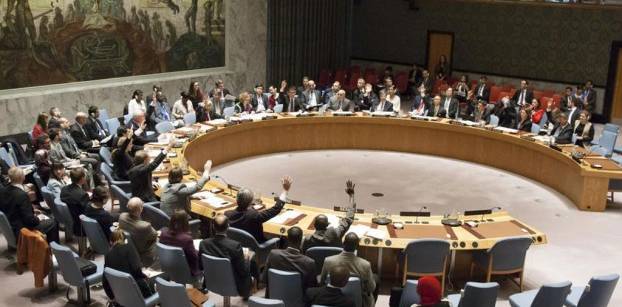Latest NEWS
- Aswat Masriya, the last word
- Roundup of Egypt's press headlines on March 15, 2017
- Roundup of Egypt's press headlines on March 14, 2017
- Former Egyptian President Hosni Mubarak to be released: lawyer
- Roundup of Egypt's press headlines on March 13, 2017
- Egypt's capital set to grow by half a million in 2017
- Egypt's wheat reserves to double with start of harvest -supply min
- Roundup of Egypt's press headlines on March 12, 2017
Egypt abstains from voting on UN resolution against sex crimes by peacekeepers
Security Council members during vote on measures presented by UN Secretary General Ban Ki-moon to prevent and combat sexual exploitation and abuse by UN peacekeepers. UN Photo/Loey Felipe
CAIRO, Mar 12 (Aswat Masriya) – Egypt was the only country to abstain from voting on Friday on a measure aimed at preventing and combating "sexual exploitation and abuse by UN peacekeepers."
During the vote at the UN Security Council (UNSC) on resolution 2272, the remaining 14 UNSC members voted in favour.
The resolution endorses UN Secretary-General Ban Ki-moon's decision "to repatriate a particular military unit or formed police unit of a contingent when there is credible evidence of widespread or systemic sexual exploitation."
A day before the vote, Ban had presented to the council a 41-page report listing the names of the countries of the alleged perpetrators and the numbers of sexual exploitation and abuse allegations.
According to the report which was issued last month, there were 99 new allegations of exploitation and abuse reported to the UN offices and agencies in 2015, compared to 80 in 2014 representing a jump by a fifth.
Out of the 99 allegations, 69 were lodged against UN personnel serving in "peace operations" in nine current missions and one closed mission, the report said.
Although not on the list of countries which were allegedly involved in abuse, Egypt proposed an amendment to the resolution.
According to a January report by the UN, Egypt is ranked 13th on a the global list of military and police contributors to UN peacekeeping operations, providing 2,787 personnel.
The new resolution stipulates three steps that a country should take if its personnel are accused of sexual exploitation or abuse: to investigate, hold the personnel accountable and inform the secretary-general of the progress of investigation.
If one of three conditions are not met by the state, whose troops are accused of committing sexual abuse, then it must replace all troops it is contributing with in peacekeeping operations.
But Egypt believes that this is collective punishment for mistakes made by individuals, a source at the foreign ministry told Aswat Masriya.
Egypt wanted to lump all three conditions before a state has to replace all of its units, meaning that a state would have had to breach all three conditions before it is required to do so.
The proposed Egyptian amendment was shot down, with nine countries voting against it and five including Russia voting in favour, prompting Egypt to abstain.
Egypt's representative at the UNSC said the way peacekeeping troops and troop-contributing countries have been "libeled is entirely unacceptable," according to the UN coverage of the meeting.
He added that this had a negative effect on troops' morale and believes that it would have been more "appropriate" to address the root causes by providing predeployment training to troops and separating their camps from the local population.
The U.S., the UK and France were among the countries that rejected Egypt's amendment.
U.S. Representative to the UN Samantha Power said that with Egypt's amendment, "there would be no cost either for non-response or for uninvestigated, unaccountable criminal behavior," in a speech she delivered on Friday, posted on the U.S. mission's website.
Egypt's proposal, according to Power, would have undermined the purpose of the resolution, "which is to get countries to respond to credible allegations against their personnel – to change the system that isn’t working."
Although all other countries in the 15-member council other than Egypt voted in favour, according to the UN, there were other countries that questioned the correctness of repatriating all unit for actions of individuals.
In October, for the fifth time Egypt became a non-permanent member at the UNSC. Its term started in January 2016 and lasts until the end of 2017.











